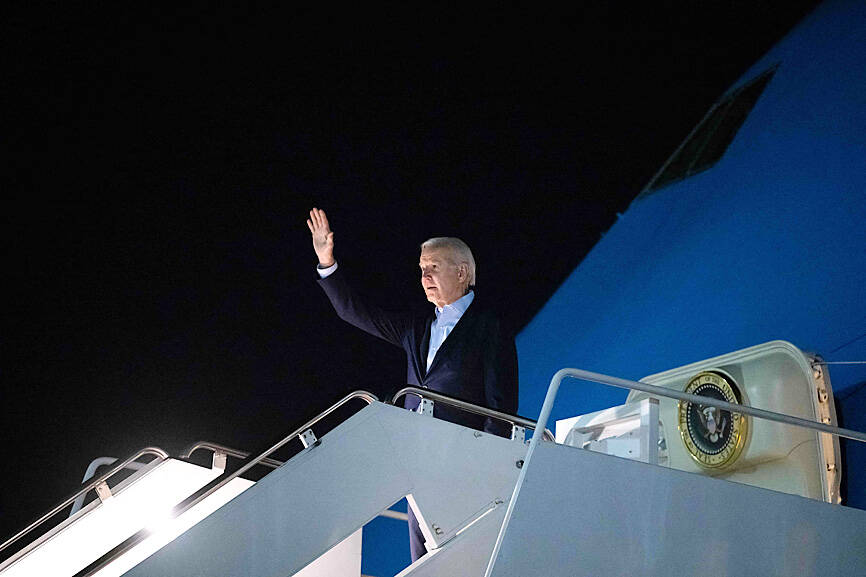US President Joe Biden on Thursday signed into law a US government funding bill for next year that includes provisions to authorize US$2 billion in loans to Taiwan to buy weapons from the US.
Biden, who is on vacation, finalized the US$1.65 trillion Omnibus Consolidated Appropriations Act covering funding for fiscal 2023.
In a news release, the White House said that the “Consolidated Appropriations Act, 2023” makes consolidated appropriations for the fiscal year ending on Sept. 30, 2023, to provide emergency assistance for the situation in Ukraine and for other purposes.

Photo: AFP
The bill, which cleared the US Congress on Dec. 23, provides a record US$858 billion in defense funding — a 10 percent increase over the funding for fiscal 2022 — and US$772 billion in non-defense funding.
In its provisions regarding Taiwan, the act allows up to US$2 billion in direct loans to Taiwan for military purposes under the “Foreign Military Financing Program.”
Taiwan would be required to pay off such loans within 12 years.
However, the bill does not include provisions to provide US$10 billion of grants — US$2 billion over the next five years — for Taiwan to buy US-made weapons, as authorized in the National Defense Authorization Act (NDAA) for Fiscal Year 2023.
The NDAA was signed into law by Biden on Friday last week, but for its funding provisions to be carried out, they must still be approved in the general appropriations act.
The appropriations bill also authorizes funding from the American Institute of Taiwan’s (AIT) budget to support a fellowship program that offers the opportunity for US federal government employees to live and work in Taiwan for two years.
The act states that after consulting with the AIT director, the US secretary of state is required to present an executive plan for the fellowship program to the Committee on Appropriations.
The funds made available by the act are not allowed to “be used to create, procure or display any map that inaccurately depicts the territory and social and economic system of Taiwan and the islands or island groups administered by Taiwan authorities.”

Taiwanese can file complaints with the Tourism Administration to report travel agencies if their activities caused termination of a person’s citizenship, Mainland Affairs Council Minister Chiu Chui-cheng (邱垂正) said yesterday, after a podcaster highlighted a case in which a person’s citizenship was canceled for receiving a single-use Chinese passport to enter Russia. The council is aware of incidents in which people who signed up through Chinese travel agencies for tours of Russia were told they could obtain Russian visas and fast-track border clearance, Chiu told reporters on the sidelines of an event in Taipei. However, the travel agencies actually applied

Japanese footwear brand Onitsuka Tiger today issued a public apology and said it has suspended an employee amid allegations that the staff member discriminated against a Vietnamese customer at its Taipei 101 store. Posting on the social media platform Threads yesterday, a user said that an employee at the store said that “those shoes are very expensive” when her friend, who is a migrant worker from Vietnam, asked for assistance. The employee then ignored her until she asked again, to which she replied: "We don't have a size 37." The post had amassed nearly 26,000 likes and 916 comments as of this

New measures aimed at making Taiwan more attractive to foreign professionals came into effect this month, the National Development Council said yesterday. Among the changes, international students at Taiwanese universities would be able to work in Taiwan without a work permit in the two years after they graduate, explainer materials provided by the council said. In addition, foreign nationals who graduated from one of the world’s top 200 universities within the past five years can also apply for a two-year open work permit. Previously, those graduates would have needed to apply for a work permit using point-based criteria or have a Taiwanese company

The Shilin District Prosecutors’ Office yesterday indicted two Taiwanese and issued a wanted notice for Pete Liu (劉作虎), founder of Shenzhen-based smartphone manufacturer OnePlus Technology Co (萬普拉斯科技), for allegedly contravening the Act Governing Relations Between the People of the Taiwan Area and the Mainland Area (臺灣地區與大陸地區人民關係條例) by poaching 70 engineers in Taiwan. Liu allegedly traveled to Taiwan at the end of 2014 and met with a Taiwanese man surnamed Lin (林) to discuss establishing a mobile software research and development (R&D) team in Taiwan, prosecutors said. Without approval from the government, Lin, following Liu’s instructions, recruited more than 70 software